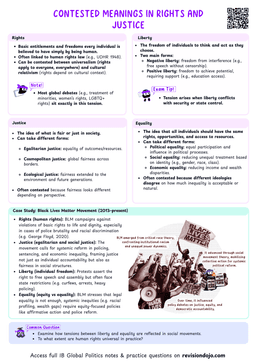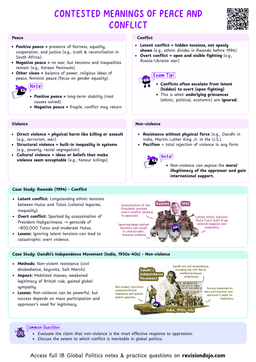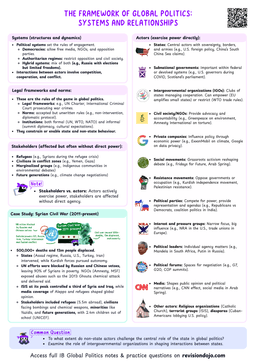Understanding the Politicization of Rights and Justice
Politicization of Rights
When actors use rights language for political gain rather than genuine concern for justice.
Rights
Rights are fundamental entitlements or freedoms that individuals possess, often considered essential for dignity, equality, and justice.
Justice
Justice refers to the fair and equitable distribution of resources, opportunities, and treatment.
- The politicization of rights and justice occurs when these concepts become contested, manipulated, or leveraged for political gain.
Why Are Rights and Justice Politicized?
- Power Dynamics:
- Rights and justice are inherently linked to power.
- Controlling these narratives can shape societal structures and influence governance.
- Cultural and Ideological Differences:
- Different societies prioritize rights and justice based on cultural, historical, and ideological contexts.
- This leads to disagreements over their interpretation and implementation.
- Globalization and Interdependence:
- As global issues like climate change and migration rise, rights and justice become central to international debates.
- This often leads to conflicts between national sovereignty and global norms.
2015 European migration crisis
- Germany: Humanitarian Approach
- Policy: In August 2015, Chancellor Angela Merkel suspended the Dublin Regulation for Syrian refugees, allowing them to apply for asylum in Germany regardless of their first point of entry into the EU.
- Outcome: Germany admitted approximately 1.1 million asylum seekers in 2015, primarily from Syria, Iraq, and Afghanistan.
- Challenges: The influx strained resources and led to political backlash, contributing to the rise of the far-right Alternative for Germany (AfD) party.
- Hungary: Security-First Approach
- Policy: In mid-2015, Prime Minister Viktor Orbán's government constructed a 4-meter-high, 175-kilometer-long border fence along Hungary's southern borders with Serbia and Croatia to prevent unauthorized crossings.
- Legislation: Hungary implemented strict laws criminalizing illegal border crossings and established transit zones where asylum seekers were detained during processing.
- Criticism: Human rights organizations, including Amnesty International, criticized Hungary's measures as violating international obligations to protect refugees.
Key Areas of Politicization
- Human Rights:
- Universalism vs. Relativism:
- Universalists argue that human rights are applicable to all, while relativists believe they should be interpreted within cultural contexts.
- Case Study:
- The Universal Declaration of Human Rights (UDHR) is often criticized for reflecting Western values, leading to debates over its applicability in non-Western societies.
- Universalism vs. Relativism:
- Social Justice:
- Economic Inequality:
- Debates over wealth distribution, taxation, and social welfare often become politicized.
- Case Study:
- The Occupy Wall Street movement in 2011 highlighted the growing divide between the wealthy and the rest of society, sparking global discussions on economic justice.
- Economic Inequality:
- Environmental Justice:
- Climate Change:
- The rights of future generations and vulnerable communities are often at odds with economic interests.
- Case Study:
- The Paris Agreement faced criticism for its non-binding nature, reflecting the tension between environmental justice and state sovereignty.
- Climate Change:
- When analyzing the politicization of rights and justice, consider the underlying power structures and interests driving these debates.
The Role of International Institutions
- United Nations:
- Promotes global norms but often struggles with enforcement due to state sovereignty.
- International Criminal Court (ICC):
- Aims to deliver justice for war crimes and crimes against humanity but faces criticism for perceived bias and limited jurisdiction.
- The ICC's focus on African leaders has led to accusations of neocolonialism, highlighting the politicization of international justice.
Challenges and Criticisms
- Selective Enforcement:
- Powerful states may ignore or manipulate international norms to serve their interests.
- Cultural Imperialism:
- The imposition of Western values through human rights frameworks can lead to resistance and backlash.
- Balancing Sovereignty and Global Norms:
- States often prioritize national interests over international obligations, leading to conflicts in areas like humanitarian intervention.
United States: Post-9/11 Human Rights Violations
- Key Violations
- Torture & Secret Detention: CIA used "black sites" to detain and torture at least 119 Muslim men post-9/11 (e.g. waterboarding, sleep deprivation).
- Guantánamo Bay: Nearly 800 detainees held since 2002, many without charge or trial. As of 2025, 15 remain.
- Indefinite Detention: Denial of fair trial and due process violated international law.
- State Response
- U.S. justified actions as necessary for national security.
- No senior officials have been held accountable.
- Obama ended the CIA program but avoided prosecutions.
- Guantánamo remains open, with calls for closure unmet.
- International Criticism
- UN and NGOs (e.g. Human Rights Watch) condemned the U.S. for violating the Convention Against Torture.
- Calls for justice, transparency, and reparations continue.
The Impact of Politicization
- Erosion of Trust:
- When rights and justice are politicized, public trust in institutions may decline.
- Polarization:
- Divisive narratives can deepen societal divides and hinder cooperation.
- Stagnation of Progress:
- Political manipulation can stall efforts to address critical issues like climate change and inequality.
- Reflect on a recent global event where rights and justice were politicized. How did this impact the outcome of the situation?
Moving Forward: Navigating the Politicization of Rights and Justice
- Promoting Dialogue and Understanding:
- Encouraging cross-cultural dialogue can help bridge gaps between universal and relativist perspectives.
- Strengthening International Institutions:
- Enhancing the legitimacy and effectiveness of organizations like the UN and ICC can mitigate selective enforcement.
- Empowering Civil Society:
- Grassroots movements and NGOs play a crucial role in advocating for rights and justice, often holding governments accountable.
- To what extent are rights and justice universal concepts, and how do cultural perspectives shape their interpretation?


